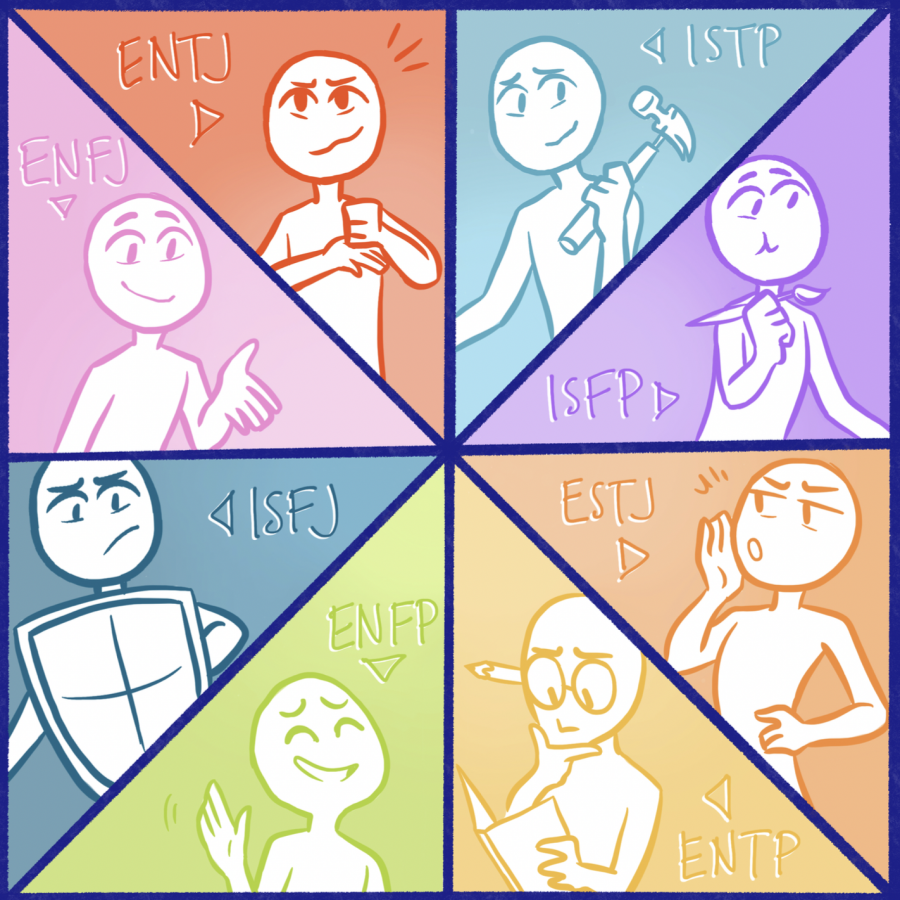Why You Should Take The Myers-Briggs Personality Test
May 30, 2021
If you’ve ever skimmed a psychology textbook or scrolled far enough down the Instagram Explore page, you may be familiar with the Myers-Briggs Type Indicator (MBTI). It’s a personality evaluator intended to categorize four fundamental traits: your attitude toward other people, how you process information, how you make decisions, and how you approach the future. After presenting a series of statements and asking participants to rate the extent to which they are true, the final result is a four-letter summary of these preferences (for example, presently speaking is an ENFJ—an extrovert, an intuitive, a feeler, and a judge). Eighty-nine Fortune 100 companies make use of the test, and the MBTI has had a total reach of fifty million people since its inception in 1963, with an additional two million every year. Given the description, however, one would likely expect the MBTI to fall next to zodiac signs or enneagrams in terms of their relative importance; what separates it from the average BuzzFeed quiz?
In the corporate world, the Myers-Briggs is often used in the context of a group effort (although it could easily be applied in schools, a convention of sorts, or anything that requires collaboration). It’s intended to maintain a diversity of personalities; an equal balance of thinkers and feelers, both big-picture and detail-oriented minds, those that plan and those that prefer to keep their options open—the list goes on. Its relevance is maintained by the fact that almost all of the traits the MBTI evaluates directly pertain to what a prospective team member can contribute to a given environment. The premise is that you, and others, can benefit as a team with the information supplied by the test.
Its massive success, however, doesn’t spare the MBTI from criticism; there are, at times, likely more skeptics than there are supporters, many noting that Katherine Briggs and her daughter Isabel Meyers, the women behind its design and the very individuals for whom the test is named, had no formal experience with studying psychology. It’s not unfathomable that some may approach the test as a deceptive pseudoscience. “What concerns me is the cultlike devotion of many consultants and practitioners to it without the examination of the evidence,” remarked Adam Grant, professor of industrial psychology at the University of Pennsylvania, to Vox. And, in this case, the hard data leans in favor of the critics—multiple studies have brought attention to the lack of consistency in results (in one instance, 50% of people that retook the test a mere five weeks after the first round were given a different type).
From a strictly empirical perspective, this is an almost fatal blow to the test’s reliability—however, while a MBTI-dictated type may not be the end all be all, that shouldn’t disqualify its virtues altogether. In an interview with the Register Forum, Davida Gable, Head of Global Accounting and External Reporting at Wayfair, advocates that corporate employees, particularly those just emerging in their field, make use of it. “First of all, I recognize that many experts totally discredit these personality tests, and feel that they can be unhelpful in pigeon-holing people into stereotypical types . . . But, there are several ways that I think they are helpful,” Gable explained. She recounted her time working with an INFP as her superior—through research, she discovered that the dynamic with her boss paralleled that of William C. Durant, founder of General Motors. An INFP himself, Durant liked to entertain big ideas and expand into new projects, but he found ongoing business details tedious and was eventually pushed out of GM by financiers—a “dreamer” personality, as she described it. “That can be great for entrepreneurial ventures, but sometimes when the rubber hits the road—like during a recession that we were in—I realized my boss’s inability to make hard decisions would eventually be a disaster. . . I then tried to model myself after Durant’s partner, Louis Chevrolet, who realized his time with Durant would be limited and thus had to navigate Durant’s impulses until he eventually sold Durant his share of the company, as well as another company Chevrolet created later.” Given the familiarity associated with Chevrolet, you may be able to guess his story’s conclusion—Durant, on the other hand, died bankrupt. This parable-of-sorts served as a blueprint for Gable’s time under her “dreamer” overseer, and in due time, she was able to do as Chevrolet did: “Get what I need, then get out.”
If you’re still not convinced of its validity, the MBTI is always an excellent icebreaker for introductions, and increases self-awareness of preferences and habits. Alisa Cohn, an executive coach with an extensive background in personality evaluation, explains that the test points more to places of improvement and compromise than anything else to BBC. “‘I’m a P, so I’m always late, so you’ll have to forgive me.’ No, if you’re a P, you should leave 20 minutes early,” she says. “On the other side of that, if someone recognises this person tends to run a little bit late, they should realise [the other person] isn’t being disrespectful. It’s just the way they are. We need to talk together about it.” It’s most useful when it isn’t treated as an exact science, but as a condensed summary of a person you’re working with—a summary that is able to change as the individual evolves. No singular test can “measure” the complexity of a given person, and it’s true that there are more than sixteen defined types of people in the world. With that said, however, you have, potentially, everything to gain (and nothing to lose) by giving it a shot.











